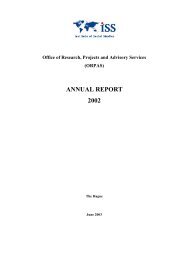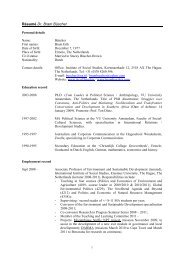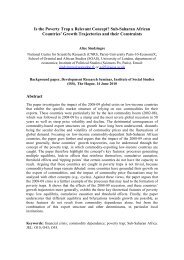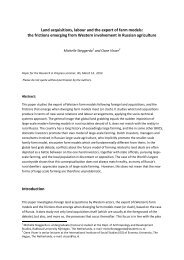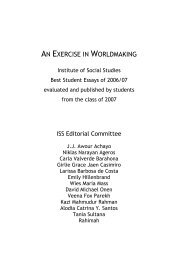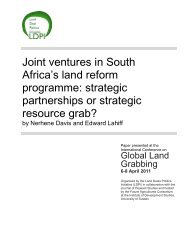AN EXERCISE IN WORLDMAKING 2009 - ISS
AN EXERCISE IN WORLDMAKING 2009 - ISS
AN EXERCISE IN WORLDMAKING 2009 - ISS
You also want an ePaper? Increase the reach of your titles
YUMPU automatically turns print PDFs into web optimized ePapers that Google loves.
15 Reimagining Reproductive Health Interventions 179<br />
The songs served as a major catalyst in the process of reconstructing<br />
meanings of what being a man or a woman signifies in our society, opening<br />
up the space for participants to express themselves by providing an artistic<br />
medium to which they could relate their ideas and feelings (Adrião et<br />
al. 2002: 207).<br />
The important part about this intervention is that it eventually belongs<br />
to the participants who are not only singing and playing music but<br />
through dialogue and education are reconstructing their own histories<br />
and identities. Once reflection has begun, sexual attitudes and risky behavior<br />
that are directly tied to social norms related to manhood can begin<br />
to be transformed.<br />
Effective interventions like those of Papai’s seek to help men understand<br />
how gender norms affect them, how norms about what it means to<br />
be ‘real men’ are harmful to women but also to men. According to MenEngage<br />
Alliance, an NGO also located in Brazil, it is incredibly important<br />
that programs give men and boys the opportunity to build the<br />
communication and negotiations skills necessary to change behaviors,<br />
such as having a sense of self-efficacy that allows them to question gender<br />
norms, negotiate with partners, question peer groups, and seek services<br />
for themselves (Ricardo & Barker 2008: 33). Successful interventions<br />
must have a wide spectrum at their core in order that gender<br />
inequalities are challenged and behavior transformed into those, which<br />
enable healthy sexual and reproductive behaviors to be practiced and<br />
sustained.<br />
LOOK<strong>IN</strong>G TOWARDS THE FUTURE OF SRH RIGHTS FOR MEN, WOMEN<br />
<strong>AN</strong>D CHILDREN<br />
There are many gaps in SRH programming, most particularly the absence<br />
of men as participants in research and interventions. Since the shift<br />
in thinking in Cairo and the explicit attention to involving men in SRH,<br />
research methodology has changed to include men and also to include<br />
more qualitative research taking into consideration power hierarchies and<br />
gender inequalities. There is now a general consensus about the importance<br />
of transforming gender relations and masculinities among programs<br />
whose interventions deliberately target gender inequalities with an<br />
ultimate aim at the realization of SRH rights by men, women, and children.<br />
Advocates for SRH rights have come a long way in appealing to<br />
the wider realm of national politicians in charge of finance and govern-




